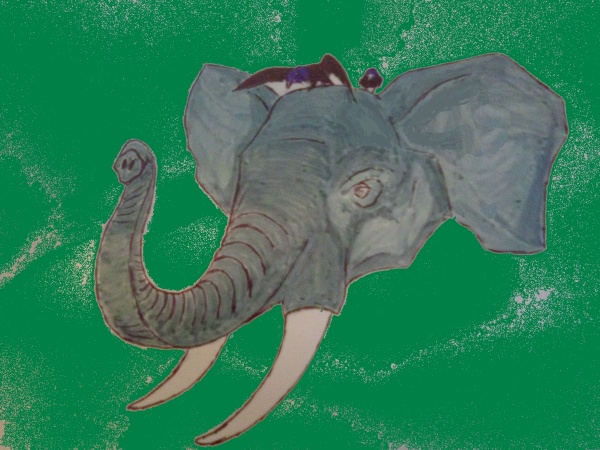Ravens and Elephants

A raven and a young forest elephant have been friends since the raven was a fledgling. He had been separated from his parents, captive North American ravens who had been transported to the Congo against their will. The elephant, then about eight years old and still living with his mother and her family, took the baby raven in. The young elephant cared for him as he matured, which happened much more rapidly for the raven than for the elephant. When the raven was three years old, well past the age he could survive on his own, he left for America in search of his parents.
As the years passed, although the raven did not find his parents (at least not yet), he became thoroughly acclimated to North America. Yet he periodically returns to Africa, by stowing away on a freighter ship, to visit his friend. Now, seven years after he initially left, the raven has again made the journey across the Atlantic, this time bringing his companion, a male crow. The elephant, at 18 years of age, no longer lives with his mother and her family, and instead is part of a larger loose knit community of forest elephants. He is excited to see his friend again and share his thoughts about things, like dinosaurs and their bones he’s found in the caves beneath the forest; about how elephants use smell in the way ravens (and humans) use sight; about exotic ocean animals like dolphins and whales, octopuses and squid. And he is eager to hear more about the land across the ocean, from his friend who has seen, and heard, so much of it.
Something of a loner, the young elephant has paid little attention to a major debate among the community of elephants– a debate addressing the fundamental relationship of elephants with humans. For thousands of years, elephants and humans lived on the African continent without major conflict (at least as a society, if not individually). Throughout this history, the elephants maintained, for the most part, a nonaggressive stance towards human societies. In turn, native African humans had given the elephants, as a society, little reason to be aggressive.
Things began to change drastically 200 years ago. European humans began to colonize Africa, and global demand for ivory increased substantially. Not only did poaching increase– government culling of elephants in the name of “conservation” decimated populations. Habitat became increasingly threatened due to human encroachment and exploitation. Now the elephants know that life on the planet is in grave danger. Many powerful and influential elephants believe they can no longer tolerate human actions which are putting them at risk….